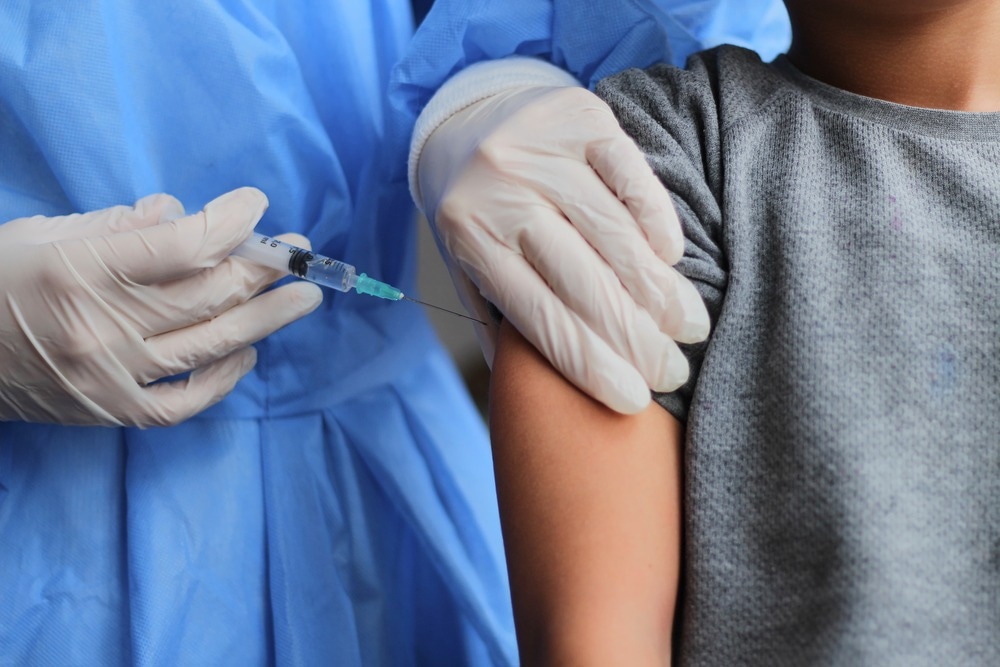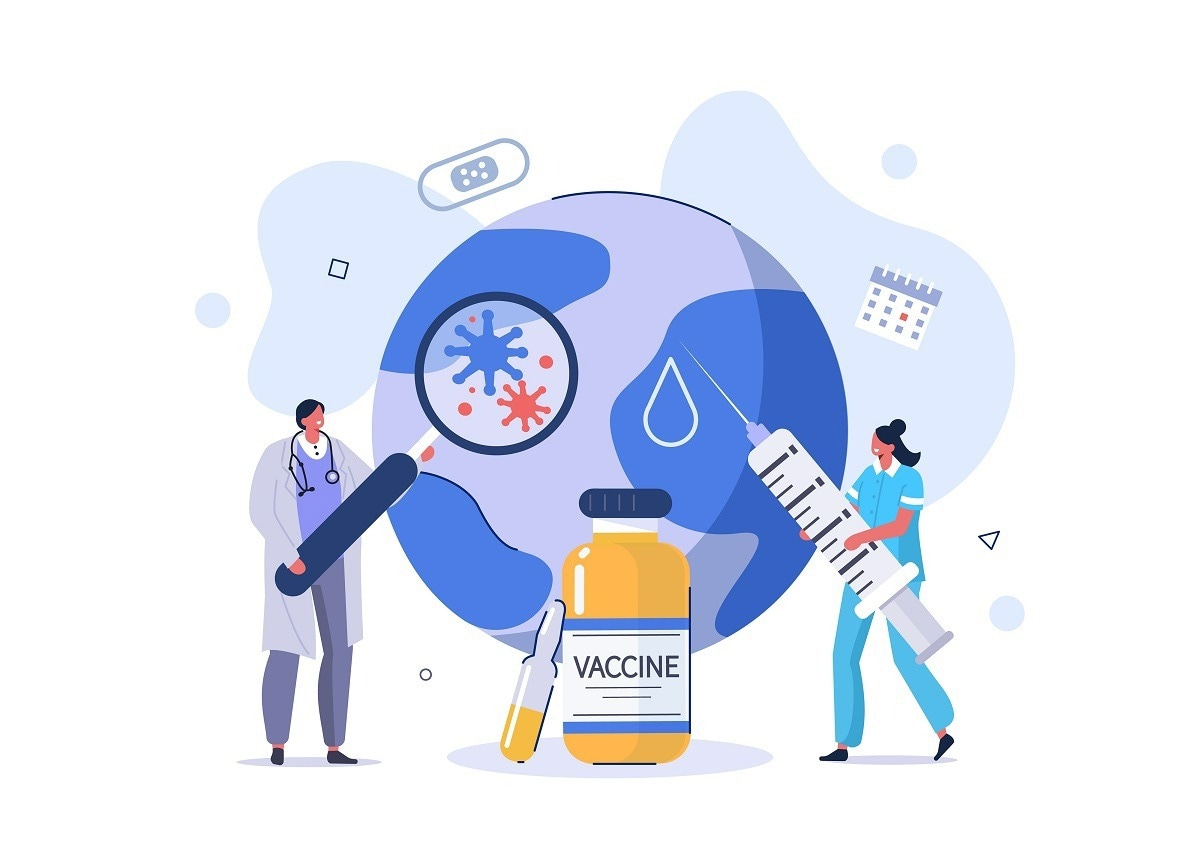The global drop in childhood vaccinations following the pandemic
How did COVID-19 prevent childhood immunization?
How can we increase global vaccination following COVID-19?
References
Further reading
The COVID-19 pandemic changed how we lived and brought economies to a stall. The repercussions of the pandemic can still be felt. Huge economic, social, and health implications continue to shape our lives. Recently, scientists have highlighted how the pandemic has negatively impacted vaccination coverage, causing the largest backslide in global childhood vaccinations in thirty years.
The global drop in childhood vaccinations following the pandemic
According to official data published by the World Health Organization (WHO) and UNICEF, 25 million children missed lifesaving vaccines in 2021, representing the largest sustained fall in childhood vaccinations in the last three decades.
Between 2019 and 2021, the percentage of infants who received the full three doses of the vaccine against diphtheria, tetanus, and pertussis fell by five percentage points. This equated to 25 million children who missed out on at least one dose of routine immunization in 2021, representing an increase of 2 million children compared with 2020 data and an increase of 6 million compared with 2019. Further, HPV vaccination coverage, such that it protects women from cervical cancer, fell by one-quarter. The recent data illustrate a significant and growing increase in children at risk of life-threatening but preventable diseases.

Around the world, the data tell the same story of children missing out on life-saving immunization programs. In Canada, monthly vaccination coverage saw a drastic drop in March 2020. In April 2020, vaccination coverage for measles was 9.9% lower than in the same month in 2019. In the UK, HPV vaccine coverage fell by 7% in girls in school year eight from 2021 to 2022 compared to the previous academic year. Vaccine coverage for HPV remains lower than pre-pandemic levels, which raises concern due to the program’s success at reducing rates of harmful infections and cervical cancer, which is particularly strong in those vaccinated at younger ages.
How did COVID-19 prevent childhood immunization?
The decline in vaccination coverage we have seen in recent years has been attributed to the COVID-19 pandemic. In 2020, healthcare systems around the globe fought to prevent the spread of the novel coronavirus while treating the millions hospitalized with the disease. Most healthcare systems were unprepared to respond to the pandemic. As a result, routine healthcare, such as vaccinations, were put on hold to direct as many resources as possible to address the pandemic.

Image Credit: Mahsun YILDIZ/Shutterstock.com
In addition, stay-at-home orders, increased vaccine misinformation, supply chain disruptions, reduced travel services, and school closures contributed to the drop in immunization rates across the globe. Due to these various Covid-19-related factors, getting routine vaccinations became more challenging, as vaccines were postponed, healthcare providers were less available to provide vaccinations, accessibility became an issue (e.g., not being able to go to school where vaccinations are often given), and parents became less willing to give children vaccinations.
How can we increase global vaccination following COVID-19?
There is an urgent need to catch up on providing routine childhood immunizations. Initially, it was hoped that vaccination coverage would catch up in 2021, but data have shown that in some cases, coverage continued to worsen during this year, and we have still not caught up to pre-pandemic levels. Diphtheria, tetanus, and pertussis vaccinations remain at their lowest levels since 2008, which has derailed the progress the world was making to meet the immunization indicator for the Sustainable Development Goals.

Image Credit: Irina Strelnikova/Shutterstock.com
The world needs a sustained catch-up program to get vaccination coverage back on track. This program will be especially important in low-income countries, which have been particularly vulnerable to the impact of the pandemic. Several strategies have been identified that would be beneficial to accelerating vaccination programs. It is advised that wait times should be decreased, and efforts should be made to address the fear and concern surrounding vaccinations driven by misinformation. In addition, work is needed to increase the availability of vaccines, especially in remote regions.
If global healthcare systems do not act to catch up on childhood immunization, we put ourselves at risk of future outbreaks of infectious diseases that the vaccination programs were set up to prevent. Already, a number of countries have reported recent measles outbreaks, which the WHO had warned against following the drastic drop in vaccinations that the pandemic has brought about. Even small pockets of measles outbreaks can be enough to fuel pandemics.
Given that we are now living in a time where childhood immunization is at its lowest rate for a generation, work must be done to get the world back on track to prevent future pandemics.
References
- Concern over drop in HPV vaccine coverage among secondary school pupils [online]. Gov.uk. Available at: https://www.gov.uk/government/news/concern-over-drop-in-hpv-vaccine-coverage-among-secondary-school-pupils (Accessed April 2023)
- COVID-19 pandemic fuels largest continued backslide in vaccinations in three decades [online]. World Health Organization. Available at: https://www.who.int/news/item/15-07-2022-covid-19-pandemic-fuels-largest-continued-backslide-in-vaccinations-in-three-decades (Accessed April 2023)
- COVID-19 pandemic leads to major backsliding on childhood vaccinations, new WHO, UNICEF data shows [online]. UNICEF. Available at: https://www.unicef.org/press-releases/covid-19-pandemic-leads-major-backsliding-childhood-vaccinations-new-who-unicef-data (Accessed April 2023)
- MacDonald, S.E. et al. (2022) “Impact of the COVID-19 pandemic on vaccine coverage for early childhood vaccines in Alberta, Canada: A population-based retrospective cohort study,” BMJ Open, 12(1). Available at: https://doi.org/10.1136/bmjopen-2021-055968.
- SeyedAlinaghi, S.A. et al. (2022) “Impact of COVID‐19 pandemic on routine vaccination coverage of children and adolescents: A systematic review,” Health Science Reports, 5(2). Available at: https://doi.org/10.1002/hsr2.516.
- Shapiro, G.K. et al. (2022) “Covid-19 and missed or delayed vaccination in 26 middle- and high-income countries: An observational survey,” Vaccine, 40(6), pp. 945–952. Available at: https://doi.org/10.1016/j.vaccine.2021.12.041.
Last Updated: Apr 24, 2023